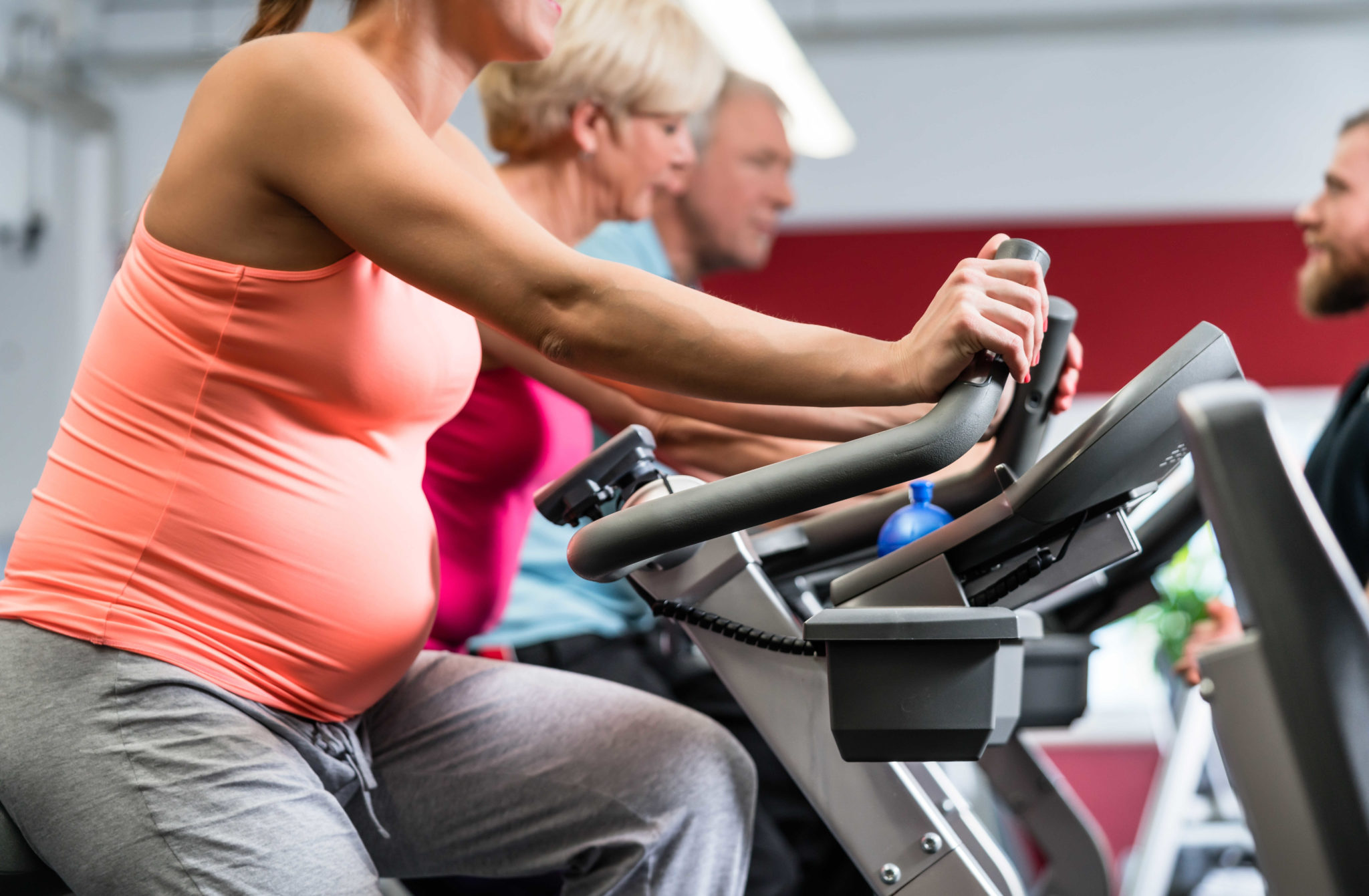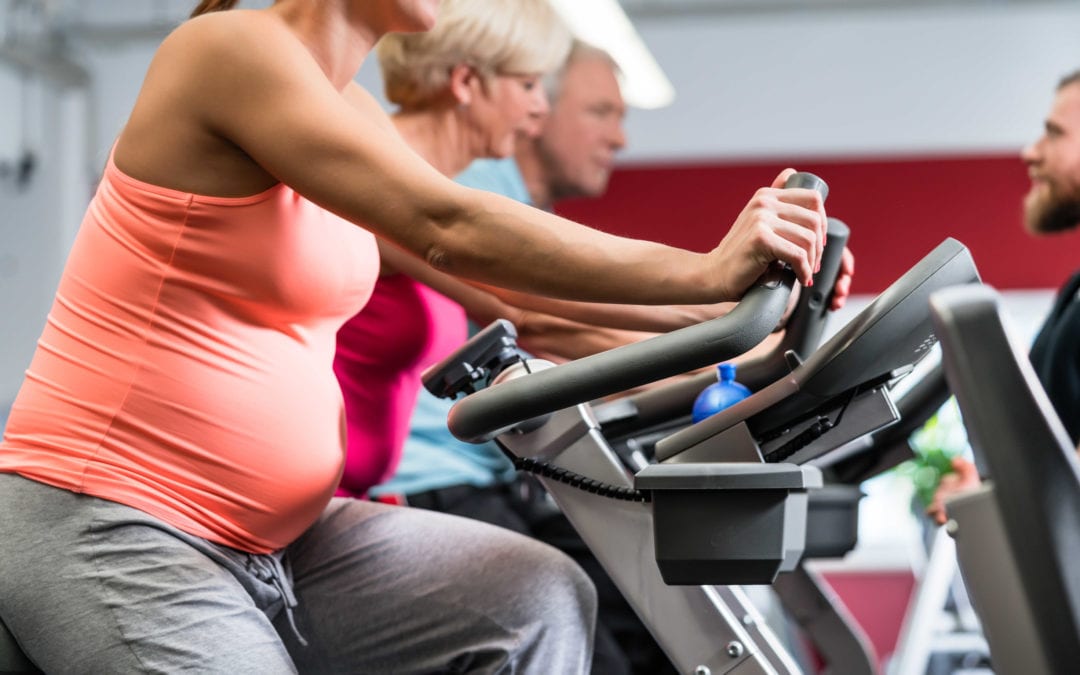
Besides helping you keep off excess pregnancy weight, exercising during pregnancy has a multitude of benefits. From keeping you happy with endorphins to making labor and delivery easier, exercise is good for expecting moms. It is important to be more cautious than you were before your pregnancy, however. Learn all about exercising during pregnancy to keep you and your little one safe.
Exercise and Pregnancy
Years ago, pregnant women were advised to be extremely careful while exercising. This included advice such as to not let their heart rate go above 140 beats per minute and to stop as soon as they were tired. Myths surrounding pregnancy and exercise, such as the false belief that exercise causes miscarriages, have made many women fearful to exercise while expecting a baby.
The good news is that studies show there is no correlation between exercise and miscarriage and that an increased heart rate doesn’t harm the baby. While you may get tired more quickly while pregnant, you can continue to exercise or begin an exercise routine.
Benefits of Exercising During Pregnancy
Keeping up your fitness routine (or beginning one) has plenty of pregnancy benefits, which include:
- Decreased chance of gaining excess weight
- Lowers your risk of gestational diabetes by 27 percent
- Makes labor and delivery easier
- Better mood
- Decreased back pain
- Increased energy
- Decreased constipation
- Decreased leg swelling
- May help decrease morning sickness
Do’s and Don’ts of Exercising While Pregnant
Though most doctors and researchers agree that exercising during pregnancy is just fine, there are some rules that you should follow.
- Do talk with your healthcare provider. Before starting, continuing or changing your exercise routine, it’s a good idea to talk with your doctor. Women who have a complicated pregnancy or who have a history of complications may be advised to take some precautions. If you were not an exerciser before getting pregnant, talk with your doctor about low-impact exercises, such as walking or swimming, that you can start now to get you into better shape.
- Do continue with the intensity level that you were at before getting pregnant. If you used to run five miles a day, it’s typically safe to continue to do so, but it’s not a good idea to start training for a half-marathon.
- Do make sure you eat enough calories. Most nutritionists recommend eating approximately 300 more calories a day during pregnancy. If you are regularly working out, make sure to replace those burned calories with a healthy snack.
- Do keep hydrated. Drink before, during and after working out. Both the sweat and increased respiration rates will take water away from your body. Replace it to avoid dehydration.
- Don’t push yourself too hard. Your blood increases approximately 50 percent during pregnancy. This means that your heart has to work about 50 percent harder to pump that blood throughout your body. Your body will be working harder, and you will get tired more easily. Don’t push yourself too hard and take breaks as needed.
- Don’t lie flat on your back. After the first trimester, lying on your back puts too much pressure on a major vein called the inferior vena cava. Too much pressure can reduce the blood flow to your heart and uterus.
- Don’t engage in contact sports or sports that might throw off your balance. Contact sports, such as soccer and basketball, should be avoided as they can result in a fall or jab to your abdomen. Sports that require balance, such as water skiing, gymnastics, mountain biking or downhill skiing, should also be avoided. Pregnant women should also never scuba dive as babies are not protected by the body from the effects of the change in pressure.
What to Expect When You Exercise During Pregnancy
If you are all set to work out, make sure that you know what to expect before beginning.
- You will get out of breath more easily. Your body has to remove between 20 and 25 percent more carbon dioxide during pregnancy, which will result in your lungs and heart working harder.
- You may feel off-balance. Not only is the weight in front of your body going to throw you off a little, but your hormones make your ligaments looser during pregnancy. This can make you feel more wobbly.
- You will tire more easily during the end of pregnancy. Your body is doing a lot of work just being pregnant; adding a strenuous workout on top of it will tire you more easily.
Signs You Should Stop Exercising
If you experience any of the following signs or symptoms during exercise, stop exercising immediately and call your healthcare provider:
- Abdominal cramping
- Vaginal bleeding
- Light-headedness
- Extreme headaches
- Extreme nausea
Exercise Tips and Advice
Always Begin by Warming Up
It’s never a good idea to just jump straight into a workout, but it can be especially harmful when you are pregnant. Warm up your muscles with arm swings, by going on a short walk or jogging in place.
If You Have Swelling, Try Swimming
Swimming will make you feel completely weightless (which isn’t a bad thing when you feel like a whale). Being off of your feet will not only feel fantastic on your joints, it can help reduce any swelling you have.
Finish by Cooling Down
Slowly bring your heart rate down and stretch out your muscles with some cool down exercises. Not only will they reduce the risk of soreness, but pregnancy will allow you to be more flexible than you ever have before.
Listen to Your Body
Even if your doctor gives you the “go ahead” to continue weight lifting and running, the most important thing you can do is to listen to your body. If it isn’t feeling right, stop. There are plenty of low-impact exercises that will keep you fit that won’t harm you.
Getting up and getting moving during pregnancy is one of the best things you can do for yourself and for your little one. Talk with your doctor and find an exercise routine that you love in order to reap all of the healthful benefits.


 Complete Our Simple Online Form
Complete Our Simple Online Form We’ll Handle All The Paperwork
We’ll Handle All The Paperwork Receive Your Free Ameda Pump
Receive Your Free Ameda Pump